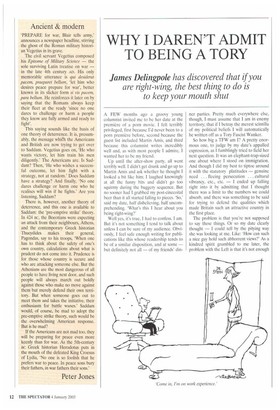Ancient & modern
'PREPARE for war, Blair tells army,' announces a newspaper headline, stirring the ghost of the Roman military historian Vegetius in its grave.
The civil servant Vegetius composed his Epitome of Military Science — the sole surviving Latin treatise on war —
in the late 4th century AD. His only memorable utterance is qui desiderat
pacem, praeparet helium, let him who desires peace prepare for war', better known in its slicker form si vis pacem, pam bellum. He reinforces it later on by saying that the Romans always keep their fleet at the ready 'since no one dares to challenge or harm a people they know are fully armed and ready to fight'.
This saying sounds like the basis of one theory of deterrence. It is, presum ably, the message whieh the Americans and British are now trying to get over to Saddam. Vegetius goes on, 'He who wants victory, let him train his men diligently.' The Americans are. Is Saddam? Then, 'He who wishes a success ful outcome, let him fight with a strategy, not at random.' Does Saddam have a strategy? And finally, 'No one dares challenge or harm one who he realises will win if he fights.' Are you listening, Saddam?
There is, however, another theory of deterrence, and this one is available to Saddam: the 'pre-emptive strike' theory.
In 424 BC, the Boeotians were expecting an attack from their neighbours, Athens, and the contemporary Greek historian Thucydides makes their general, Pagondas, say to his troops, 'When one has to think about the safety of one's own country, calculations about what is prudent do not come into it. Prudence is for those whose country is secure and who are attacking someone else. But the Athenians are the most dangerous of all people to have living next door, and such people will always march out boldly against those who make no move against them but merely defend their own terri tory. But when someone goes out to meet them and takes the initiative, their enthusiasm for battle wanes.' Saddam would, of course, be mad to adopt the pre-emptive strike theory, such would be the overwhelming American response. But is he mad?
If the Americans are not mad too, they will be preparing for peace even more keenly than for war. As the 5th-century
BC Greek historian Herodotus puts in the mouth of the defeated King Croesus
of Lydia, 'No one is so foolish that he prefers war to peace. In peace sons bury their fathers, in war fathers their sons.'
Peter Jones


















































 Previous page
Previous page